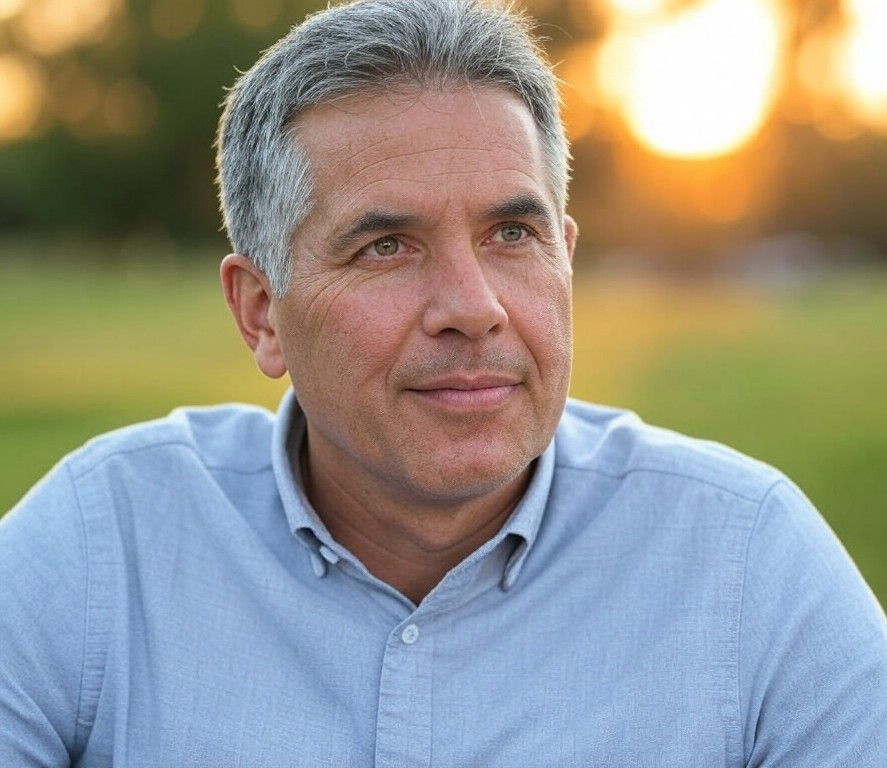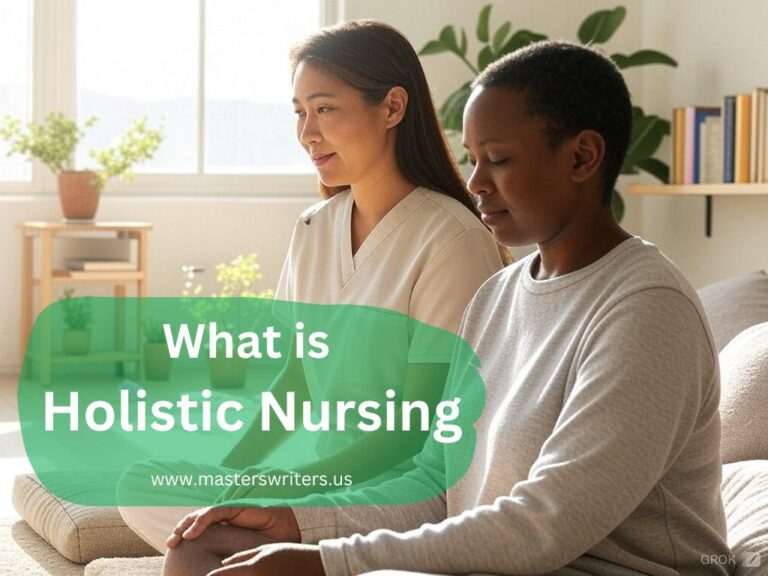Lifestyle
Holistic Nursing: Everything You Should Know


Explore the essence of holistic nursing, where care transcends traditional methods to embrace the whole person—mind, body, and spirit. Learn about its principles, career opportunities, and how it revolutionizes patient care.
An illustration of two individuals engaged in a tranquil setting, with one likely being a holistic nurse and the other a patient, symbolizing the essence of holistic nursing care. The background includes calming elements like plants and a serene light, enhancing the atmosphere of mind, body, and spirit healing. The text “What is Holistic Nursing” is prominently displayed, inviting viewers to explore this comprehensive approach to health care.
Holistic Nursing: Everything You Should Know
Holistic nursing embraces a comprehensive view of health, nurturing the entirety of an individual’s existence—mind, body, and spirit—for a fuller, more harmonious well-being. This method introduces a serene balance into the often hectic world of healthcare, going beyond mere symptom management to engage with health’s emotional and spiritual dimensions. The aim is to foster an environment where patients can thrive in all areas.
In this article, we delve into the essence of holistic nursing, exploring its foundational philosophies, how it sets itself apart from conventional nursing practices, and what steps one might take toward certification in this field. Whether you’re a healthcare professional contemplating a shift towards holistic practices or simply curious about this integrative approach to care, you’ll find a wealth of information here.

Ready to Ace Your Nursing Research Paper?
Let us handle the heavy lifting while you focus on what truly matters.
What Is Holistic Nursing
Holistic nursing is an approach that treats the person as a whole, integrating physical, psychological, emotional, social, and spiritual elements into patient care. Unlike traditional nursing, which often focuses primarily on physical symptoms, holistic nursing seeks to understand and address the interconnectedness of these aspects. It employs a range of therapies, from conventional medicine to complementary practices like meditation, nutrition, and energy work, aiming to promote healing and wellness at every level of being. The philosophy behind holistic nursing is that proper health involves equilibrium and harmony within oneself and one’s environment, fostering recovery from illness, prevention, and overall well-being.
Check the related article on preparing a nursing care plan.
What Does a Holistic Nurse Do
In their daily work, holistic nurses blend conventional treatments with alternative therapies to nurture the whole person. They might introduce patients to yoga to enhance flexibility and mindfulness, suggest herbal remedies for symptom relief, or use sound therapy to restore inner peace. These approaches work alongside standard medical treatments to craft a nurturing atmosphere conducive to healing.
Here are some practices that holistic nurses might integrate:
- Yoga or Tai Chi for physical and mental balance
- Herbal supplements tailored to individual health needs
- Sound therapy using instruments like singing bowls for relaxation
- Art therapy to express and process emotions
- Light therapy to address seasonal mood changes or sleep disorders
- Hydrotherapy for pain relief or muscle relaxation
Education plays a pivotal role in holistic nursing. These nurses don’t just prescribe; they educate. They delve into how lifestyle choices, like sleep hygiene, physical activity, and nutrition, directly influence health outcomes, encouraging patients to engage actively in their healing process.
Crucially, holistic nurses cultivate deep, empathetic relationships with their patients. By truly listening and understanding, they can address not just the symptoms but the emotional and psychological dimensions of health. This personalized care fosters an environment where patients feel seen, heard, and empowered in their journey towards wellness.
Holistic Nurse Certification
Earning certification in holistic nursing involves a structured process to validate a nurse’s competence in delivering care that addresses the patient’s whole being. The American Holistic Nurses Association (AHNA) manages these certifications, ensuring nurses are equipped to provide a comprehensive approach to health.
Here are the certification pathways:
- Holistic Nurse Board Certified (HN-BC) – Designed for registered nurses (RNs) looking to specialize:
- RN License: Must have an active, current RN license in the U.S. or an equivalent international license.
- Experience: Requires at least one year of practice as an RN, amounting to 2,000 hours, with 48 hours dedicated to holistic nursing education.
- Education: Proof of holistic nursing education, either integrated into your nursing degree or through specialized courses.
- Certification Exam: After meeting the prerequisites, candidates must pass an exam that tests their holistic nursing knowledge and competencies.
- Advanced Holistic Nurse Board Certified (AHN-BC) – For nurses with advanced education and experience:
- Advanced Nursing Degree: An active RN license plus a master’s or higher degree in nursing, focusing on holistic health principles.
- Experience: Accumulate 2,000 hours of advanced practice in holistic nursing within the last five years, alongside 48 hours of continuing education in this area.
- Certification Exam: This certification also hinges on passing an exam, but one tailored to advanced holistic nursing practices.
Both the HN-BC and AHN-BC certifications are valid for five years. Renewal involves demonstrating ongoing practice in holistic nursing and completing further education to keep abreast of evolving holistic care methodologies. This commitment to continuous learning ensures that certified holistic nurses remain at the forefront of their field, providing the best care possible.
Meanwhile, you can always seek assistance with nursing homework from our expert writers.
Holistic Nursing Salary and Job Outlook
The salary for holistic nurses can vary significantly based on location, experience, and the specific settings where they practice. The median annual salary for registered nurses, including those practicing holistic nursing, is around $77,600, with holistic nurse practitioners potentially earning an average of $103,100 annually. States like California, Washington, and Wyoming are among the highest paying, with urban areas offering higher salaries due to the cost of living and demand for holistic care.
The job outlook for holistic nursing is positive, aligning with the broader demand for registered nurses. The Bureau of Labor Statistics projects employment for RNs to grow by 6% from 2021 to 2031, which is about as fast as the average for all occupations. As the healthcare industry increasingly recognizes the value of holistic care, particularly in preventive health and patient-centered approaches, the demand for holistic nurses is expected to rise, providing a robust job market for those with these specialized skills.
Holistic Care in Nursing Examples
To illustrate holistic care in nursing, consider these practical scenarios where this approach makes a significant difference:
Scenario 1: Assisting with Post-Traumatic Stress
A patient with PTSD might receive medication and therapy from conventional care, but a holistic nurse would also focus on the patient’s environment and lifestyle. They might introduce therapeutic art sessions to help the patient express hard-to-verbal emotions or recommend nature therapy, where outdoor spending can be calming. This integrated care aims to heal the psychological effects and improve overall life quality.
Scenario 2: Addressing End-of-Life Care
For a patient in palliative care, a holistic nurse would ensure comfort in all aspects. Beyond managing pain and symptoms, they might offer music therapy to soothe the patient, engage in legacy projects where the patient can share wisdom or stories with loved ones, or hold space for spiritual counseling. This approach respects the patient’s wholeness, focusing on dignity, peace, and closure in their final days.
Scenario 3: Enhancing Recovery in Mental Health
When dealing with someone recovering from depression, a holistic nurse might incorporate light therapy to combat seasonal affective disorder or encourage a regimen of exercise known to boost endorphins. They could also teach mindfulness practices to help manage mood swings and promote a sense of peace and presence. By addressing mental health from multiple angles, the holistic nurse aids in fostering a more sustainable recovery, emphasizing the interconnectedness of physical activity, environment, and mental state.
How to Become a Holistic Nurse: 3 Key Steps
1. Educational Foundation
Begin by obtaining a Bachelor of Science in Nursing (BSN) or an Associate Degree in Nursing (ADN), followed by passing the NCLEX-RN to become a licensed registered nurse (RN). This foundational education provides the necessary medical knowledge. To specialize in holistic nursing, seek out nursing programs or courses that emphasize holistic principles, such as those focusing on alternative therapies, nutrition, or mind-body practices.
2. Holistic Nursing Training
After becoming an RN, further your education in holistic care through specialized training or certification programs. Organizations like the American Holistic Nurses Association (AHNA) offer courses and workshops that cover holistic nursing practices, including energy healing, therapeutic touch, and integrative health approaches. You might also consider attending conferences or symposia to network with other holistic health professionals and learn about the latest in holistic care.
3. Certification and Practice
To officially become a certified holistic nurse, pursue certification from a recognized body like the AHNA. There are two primary levels: Holistic Nurse Board Certified (HN-BC) for RNs and Advanced Holistic Nurse Board Certified (AHN-BC) for those with advanced degrees. Certification requires passing an exam that tests your knowledge of holistic nursing principles, and you’ll need to demonstrate a certain amount of clinical practice hours and continuing education in holistic care. Once certified, engage in continuous practice and education to keep your certification current, ensuring you remain at the forefront of holistic nursing practices.
4 Great Holistic Nursing Programs
Below is an overview of four notable holistic nursing programs, including their descriptions, lengths, and tuition fees:
Program Name | Description | Length | Tuition Fees |
Advanced Holistic Nursing (AHN) – Florida Atlantic University | This program is designed to advance knowledge in holistic nursing, focusing on healing and caring. It integrates mind-body practices, energy healing, and manipulative body practices. Note that the program has been suspended for new applicants since Fall 2024, but it’s worth mentioning for its previous offerings. | 33 credits (typically about 2 years for part-time students) | $371.82 per credit for Florida residents and $1,026.81 per credit for non-residents. Total program cost: $12,270.06 for residents and $33,884.73 for non-residents. |
Holistic-Integrative Health Care Specialist Certification – Pacific College | Pacific College offers an online certification for RNs and APRNs interested in integrating holistic care. It’s structured as an independent study with one-on-one faculty mentorship, covering holistic health principles and practices. | Depending on course load, the program can be completed in as few as two terms. | $975. |
MSN with Holistic Concentration – Tennessee University | This master’s program prepares nurses to practice with a holistic approach, focusing on integrating the mind, body, and spirit in patient care. It requires students to possess a BSN and have an active RN license. | Typically 2-3 years part-time or 1-2 years full-time. | $30,000 to $60,000. |
Holistic Nursing Online Graduate Certificate – University of Connecticut | This certificate program is designed for nurses looking to specialize in holistic care. It’s entirely online and focuses on integrating holistic practices into nursing. | 9 credits, which can typically be completed in one academic year. | $925 per credit, making the total cost for the certificate $8,325. |
Please note that tuition fees can change, and it’s advisable to check the latest information directly from the institutions for the most current costs and program availability. Also, the length of the program can vary based on individual study pace and course load.
5 Potential Holistic Nursing Careers
Holistic nursing offers a variety of career paths where alternative therapies complement traditional medical treatments. Here are five distinct roles in holistic nursing, along with their responsibilities, salary ranges, and typical work settings:
1.Holistic Nurse Practitioner
Duties: Provides comprehensive patient care, integrating conventional medicine with holistic practices like dietary advice, stress management, and therapies such as acupuncture or herbal medicine. They can diagnose, treat, and prescribe, focusing on the whole person’s health.
Salary: $115,000–$140,000 annually
Work Settings: Independent clinics, wellness centers, hospitals
2. Holistic Health Coach
Duties: Assists clients in making lifestyle adjustments to enhance their well-being. This includes coaching on nutrition, physical activity, emotional balance, and mindfulness practices to foster a healthier lifestyle.
Salary: $50,000–$70,000 annually
Work Settings: Health coaching businesses, corporate wellness programs, private practices
3. Holistic Hospice Nurse
Duties: Delivers end-of-life care, focusing on comfort in all dimensions—physical, emotional, and spiritual. They may use alternative therapies like music, aromatherapy, or meditation to ease the transition process.
Salary: $65,000–$85,000 annually
Work Settings: Hospice facilities, patients’ homes, hospitals
4. Holistic Nurse Educator
Duties: Educates future nurses on the principles of holistic care, integrating complementary therapies into nursing education. They design curricula, teach courses, and mentor students on holistic health practices.
Salary: $70,000–$95,000 annually
Work Settings: Nursing schools, academic institutions, healthcare training programs
5. Director of Holistic Wellness Programs
Duties: Manages and develops wellness initiatives that include fitness, nutrition, stress reduction, and alternative therapies like yoga or Reiki. They oversee implementing these programs to promote health within organizations or communities.
Salary: $85,000–$115,000 annually
Work Settings: Corporate health initiatives, hospitals, community health centers
These careers reflect the breadth of opportunities available to those passionate about integrating holistic principles into healthcare, offering personal and professional fulfillment.

Stressed About Looming Deadlines?
Let us craft a well-researched and impactful paper for you!
To Wrap Up
Holistic nursing stands out as a transformative approach to health care, where the focus is not just on treating the disease but nurturing the whole person. By integrating traditional medical knowledge with a spectrum of holistic therapies, holistic nurses offer a path to healing that respects and addresses the intricate connections between mind, body, spirit, and environment. Whether considering a career in this field, expanding your nursing practice, or seeking a more rounded approach to your health, understanding holistic nursing opens avenues for better health outcomes and a more compassionate, patient-centered care model. As we move forward, the principles of holistic nursing are likely to gain even more recognition, proving that genuine health care involves caring for the whole person.
FAQs
What is holistic nursing?
Holistic nursing is a specialty within the nursing field that focuses on treating the whole person—body, mind, spirit, and emotions—rather than just addressing specific symptoms or diseases. It integrates conventional medicine with complementary therapies such as nutrition guidance, stress management, meditation, and other alternative treatments to promote healing and wellness across all aspects of a person’s life.
What is the difference between traditional and holistic nursing?
Traditional nursing primarily focuses on the patient’s physical health, aiming to treat and manage medical conditions through conventional medical practices, medication, and procedures. In contrast, holistic nursing looks beyond physical symptoms to consider the patient’s emotional, psychological, social, and spiritual health. Holistic nurses employ a broader range of therapies, including complementary and alternative medicine, to support a patient’s overall well-being, emphasizing prevention, patient empowerment, and healing of the whole person.
What is holistic care in nursing?
Holistic care in nursing is an approach where nurses provide care that encompasses all aspects of a patient’s existence—physical, emotional, mental, social, and spiritual. This care modality seeks to treat the illness and the individual’s lifestyle, environment, and personal values. Holistic care involves listening to patients, understanding their unique needs, and combining traditional medical treatments and alternative therapies to enhance the patient’s quality of life and promote healing more comprehensively.
Sources:
Sater-Wee, D. (2023). Holistic nursing salary and job outlook [2023]. American Institute of Alternative Medicine. https://www.aiam.edu/nursing/holistic-nursing-salary/
Nurse.org. How to become a holistic nurse. https://nurse.org/articles/holistic-nurse-interview/
Hashtag Nursing. How to become a holistic nurse: The definitive guide. https://www.hashtagnursing.com/career-guide/holistic-nurse/

